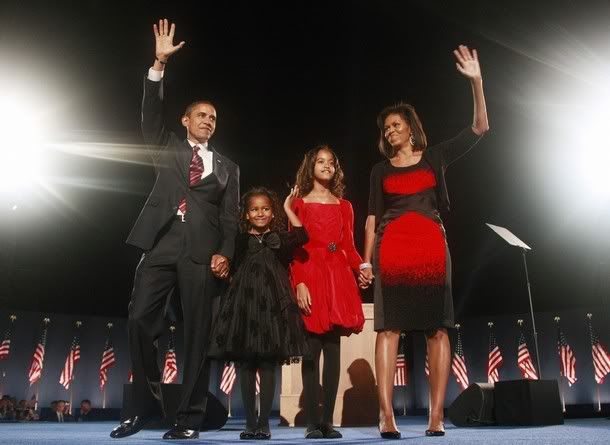The First Family (and a comment)

Eugene Robinson, WashPost (11/04/08):
Whoever wins this election, I understand what Barack Obama meant when he said his faith in the American people had been "vindicated" by his campaign's success. I understand what Michelle Obama meant, months ago, when she said she was "proud of my country" for the first time in her adult life. Why should they be immune to the astonishment and vertigo that so many other African-Americans are experiencing? Why shouldn't they have to pinch themselves to make sure they aren't dreaming, the way that I do?
I know there's a possibility that the polls are wrong. I know there's a possibility that white Americans, when push comes to shove, won't be able to bring themselves to elect a black man as president of the United States. But the spread in the polls is so great that the Bradley effect wouldn't be enough to make Obama lose; it would take a kind of "Dr. Strangelove effect" in which voters' hands developed a will of their own.
I'm being facetious but not unserious. In my gut, I know there's a chance that the first African-American to make a serious run for the presidency will lose. But that is precisely what's new, and, in a sense, unsettling: I'm talking about possibility, not inevitability.
For African-Americans, at least those of us old enough to have lived through the civil rights movement, this is nothing short of mind-blowing. It's disorienting, and it makes me see this nation in a different light.
You see, I remember a time of separate and unequal schools, restrooms and water fountains -- a time when black people were officially second-class citizens. I remember moments when African-Americans were hopeful and excited about the political process, and I remember other moments when most of us were depressed and disillusioned. But I can't think of a single moment, before this year, when I thought it was within the realm of remote possibility that a black man could be nominated for president by one of the major parties -- let alone that he would go into Election Day with a better-than-even chance of winning.
Let me clarify: It's not that I would have calculated the odds of an African-American being elected president and concluded that this was unlikely, it's that I wouldn't even have thought about such a thing.
African-Americans' love of country is deep, intense and abiding, but necessarily complicated. At its hour of its birth, the nation was already stained by the Original Sin of slavery. Only in that past several decades has legal racism been outlawed and casual racism made unacceptable, at least in polite company. Millions of black Americans have managed to pull themselves up into mainstream, middle-class affluence, but millions of others remain mired in poverty and dysfunction.
A few black Americans broke through into the highest echelons of American society. Oprah Winfrey became the most powerful woman in the entertainment industry by appealing to an audience that is mostly white. Richard Parsons, Stanley O'Neal and others became alpha males in the lily-white world of Wall Street. Through superhuman skill and unbending will, Tiger Woods came to dominate a sport long seen as emblematic of white privilege.
Along came Barack Obama, a young man with an unassailable resume and a message of post-racial transformation. Initially, a big majority of African-Americans lined up behind his major opponent in the Democratic primaries, Hillary Clinton. The reason was simple: In the final analysis, white Americans weren't going to vote for the black guy. Better to go with the safe alternative.
But an amazing thing happened. In the Iowa caucuses, white Americans voted for the black guy. That's the moment Obama was referring to when he said his faith in the American people was vindicated. For me, it was the moment when the utterly impossible became merely unlikely. That's a huge, fundamental change, and it launched a sequence of events over the subsequent months that made me realize that some things I "knew" about America were apparently wrong.
Even if John McCain somehow prevails, that won't change the fact that Obama won all those primaries, or that he won the nomination, or that he raised more money than any candidate in history, or that he rewrote the book on how to run a presidential campaign. Nothing can change the fact that so many white Americans entrusted a black American with their hopes and dreams.
We can all have a new kind of pride in our country.















<< Home